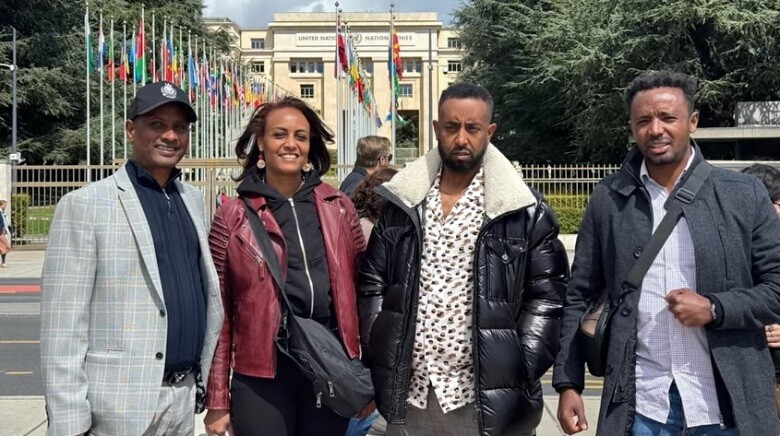By Maxwell Akalaare Adombila and Rachel Savage
A senior official from the International Monetary Fund (IMF) stated on Friday that discussions are ongoing between the IMF and Ethiopia regarding a loan and reforms package, despite the existence of certain discrepancies. In order to obtain the support of the IMF, Ethiopia might have to consider devaluing its birr currency, as it currently trades on the black market at a rate approximately 50% lower than the official exchange rate against the U.S. dollar. While the IMF has not explicitly stated that this is a requirement for funding, it generally prefers exchange rates that are determined by the market and exhibit flexibility.
A senior official from the International Monetary Fund (IMF) stated on Friday that discussions are ongoing between the IMF and Ethiopia regarding a loan and reforms package, despite the existence of certain discrepancies. In order to obtain the support of the IMF, Ethiopia might have to consider devaluing its birr currency, as it currently trades on the black market at a rate approximately 50% lower than the official exchange rate against the U.S. dollar. While the IMF has not explicitly stated that this is a requirement for funding, it generally prefers exchange rates that are determined by the market and exhibit flexibility.
He expressed a sense of cautious optimism while refraining from divulging specifics about the remaining unresolved issues. He mentioned that discussions will naturally take the time they require.
Ethiopia has not received any financial assistance from the IMF since 2020, and its previous agreement with the fund faced challenges in 2021. Recently, in late 2022, the federal government and a rebellious regional authority reached an agreement to bring an end to a two-year civil conflict
Piris Chavarri has acknowledged that Ethiopia’s financing requirements have been generally agreed upon, without providing any specific details. However, he refrained from commenting on the reports suggesting that the agreement might involve a $3.5 billion loan from the IMF. Additionally, Ethiopia is currently engaged in discussions with the World Bank regarding a potential $3.5 billion support package. Furthermore, the country aims to secure an additional $3.5 billion through a debt restructuring process, as disclosed by a Western diplomat who is well-informed about the matter.
On Thursday, the foreign ministry of Ethiopia stated that the finance minister and central bank governor of the country had a meeting with senior executives from the IMF and World Bank in Washington. The purpose of the meeting was to discuss the progress of ongoing reforms, which included topics such as liberalization and addressing foreign exchange distortions.
On Thursday, the foreign ministry of Ethiopia stated that the finance minister and central bank governor of the country had a meeting with senior executives from the IMF and World Bank in Washington. The purpose of the meeting was to discuss the progress of ongoing reforms, which included topics such as liberalization and addressing foreign exchange distortions.
In an email statement on Thursday, a representative from the World Bank expressed their positive outlook on the potential effects of an upcoming agreement. However, they acknowledged that there are still various subsequent stages to be completed and the specifics of these next phases are currently being finalized. This information was reported by Maxwell Akalaare Adombila and Rachel Savage in Johannesburg, with additional contributions from Aaron Ross in Nairobi and Dawit Endeshaw in Addis Ababa. The editing was done by Mark Potter.
—————————-

















The Economic Policies of Ethiopia: A Critical Examination vis-à-vis IMF loan granting
Importation Ban and Its Consequences
In an attempt to manage the foreign exchange crisis, the Ethiopian government a couple of years ago imposed a ban on the importation of over 30 goods. These goods, deemed non-essential (by the authorities), ranged from packed food to fish, cheese, chocolate, household items, furniture and even umbrellas, to name a few. The rationale behind this decision was to prioritize the limited hard currency for the import of vital items such as medicines and agricultural inputs. However, this policy only led to a surge in inflation rates and a fierce resurgence of black market activities. The restriction on imports created scarcity, driving up prices and encouraging underground trade, which further destabilized the official economy.
Foreign Exchange (F/X) Restrictions
The government’s increasingly stringent foreign exchange restrictions have had a profound impact on the economy. By ordering banks to deny foreign currency for businesses importing government-declared non-priority goods (and lately even denying importers the use of their own F/X for importations of such goods), the government effectively froze the import of dozens of items. This move was intended to shore up dwindling foreign reserves but resulted in a significant disparity between the official and black-market exchange rates. The scarcity of hard currency has driven the black-market value of a dollar to exceed the official rate by over 100%, marking a historic economic downturn. It should be acknowledged that foreign exchange restrictions in Ethiopia have been in place for as long as anyone can recall. However, these measures have been ineffective in consistently maintaining the official supply of foreign currency. Thus, it might be prudent at long last to contemplate a different strategy and eliminate these restrictions altogether (at this point in time there’s not much to lose, if nothing), allowing the forces of the free market to take over.
Megaprojects and Their Utility
Ethiopia has embarked on several megaprojects – the latest being a grand palace on the outskirts of the city and the last-minute announced razing of an hystorical quarter of the capital without providing any sort of relocation alternatives to the traders and residents – whereas other completed ones are falling apart (e.g. the Addis Ababa light rail system). While these projects are ambitious and aim to transform the country’s infrastructure, there is growing skepticism about their practicality and return on investment. Critics argue that these projects consume vast amounts of resources without addressing the immediate needs of the population, such as job creation and poverty alleviation: one instance being the Grand Ethiopian Reinassance Dam which, although nearly fully operational, still leaves the majority of the population without electricity, including the capital city. And the authorities sistematically fail to explain why, while power-angry Chinese criptocurrency miners are setting up business near the dam, devouring great chunks of the electricity produced with no benefit whatsoever for the sorrouding areas.
Repercussions on the Population
The economic policies have had a direct and often detrimental effect on the Ethiopian populace. The importation ban and F/X restrictions have led to increased living costs, with inflation rates soaring and essential goods becoming less affordable. Moreover, the focus on megaprojects has been questioned in terms of their contribution to the overall well-being of citizens, as many continue to struggle with poverty and lack of access to basic services.
In conclusion, the Ethiopian government’s shortsighted economic policies have led to consequences that have exacerbated economic challenges. It is crucial for policymakers to reassess these strategies, considering both the short-term and long-term needs of the nation and its people. A balanced approach that fosters sustainable development and equitable growth is essential for Ethiopia’s progress. But the lingering concern remains: do those in authority prioritize the welfare and prosperity of their citizens over their personal interests and reckless ambition? This is really what the IMF will have to evaluate, while standing firm on their ground until radical and effective reforms start to be implemented prior to any new loan being agreed upon.